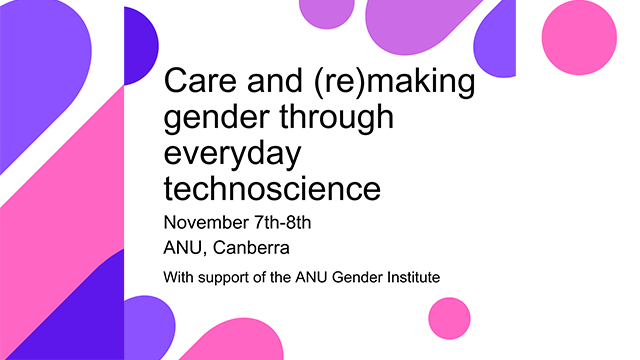
Background
'Care' has been studied within various scholarly fields to critically interrogate gender's relationship to activities that sustain and support life (de la Bellacasa 2011; Mol, Posser, and Pols 2010; Murphy 2015). Within science and technology studies (STS), notions of care have focussed on institutional, often healthcare, settings (Mol 2008). While productive for expanding knowledge on these particular relations and politics, many questions remain about how daily, quotidian, and unofficial relations of care materialise (Carr 2023; Rosner 2014). How does care take shape outside or alongside institutionalised settings and channels? What can we learn about how forms of care constitute gender when they are heavily influenced—and at times disrupted—by technology? How does care intersect with social markers of difference?
The ANU is hosting a 2-day workshop that addresses such questions with the aim to foster collective and critical examinations of what gender studies calls 'the everyday’ (Sim 2015). By this, we are referring to informal systems of care that are often not evident in formal systems and institutions, and their sometimes explicit exclusion of some marginalised groups. This forum supports scholars studying how technologies of care and caring for technologies shape what gender is and how it's done – both queering and querying the gendered compositions and representations of care.
More information in the PDF document below.
How to apply
Applications should include:
- An abstract (up to 300 words) of a paper that you plan to develop through participation in workshop
- A biographical statement (up to 200 words) about your educational background, and research interests
Please fill out this Google Form. Email the organisers if you have trouble with accessing the Form.
Timelines
Applications due: 16 August 2024
Communication of acceptance: from late August
Submission of draft manuscripts (2,000-5,000 words): 11 October 2024
Workshop: 7-8 November 2024 at the Australian National University in Canberra
Costs
The workshop will provide morning tea, lunch, and afternoon tea free of cost to the participants. However, all participants are expected to fund their own travel and accommodation.
Location
Speakers
- Dr Jaya Keaney
- Dr Thao Phan
Contact
- Tate Morgan
File attachments
| Attachment | Size |
|---|---|
| ANU_Branding_-_Care_and_re-making_gender_through_everyday_technoscience_word_version.pdf(291.11 KB) | 291.11 KB |